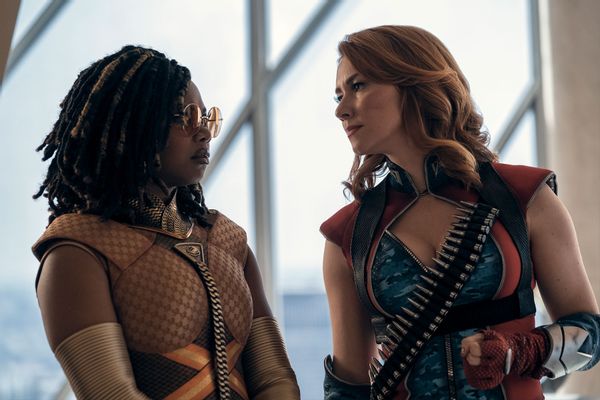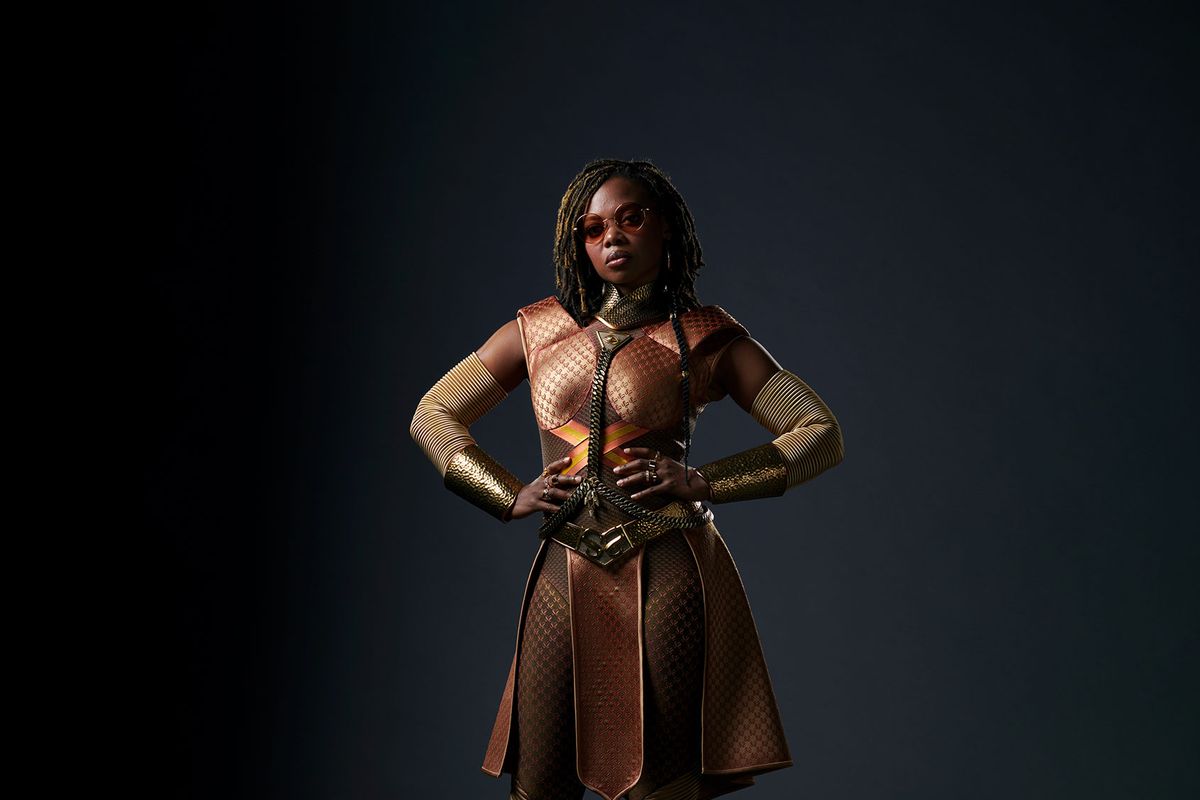In the bloody, raunchy, gooey and frequently oh-so-wrong world of "The Boys," Antony Starr’s Homelander is a psychotic version of Superman beloved by his human followers. Homelander is the star of a show that begins from the moment the world awakens until we all sleep. We're not even extras — we're expendable. Especially people of color.
But like America itself and the game show host obsessed with ruling it, Homelander isn't above acknowledging marginalized folks' usefulness. Enter Susan Heyward’s character Sister Sage, created specifically for the TV show. Sage is the most intelligent sentient being on the planet. In comic book terms, she's on par with Brainiac or Lex Luthor, two supervillains who have forced DC Comics’ greatest heroes to destroy a lot of property and natural landscapes in the name of saving humankind.
But what those figures have that Sage lacks is power, money and respect. Luthor, despite bearing an overt hatred for everyone he deems to be his lesser, won the presidency three times. Sage couldn't clear a primary.
Luthor has also invented many weapons of mass destruction, mainly because he can. Sage, who was raised in working-class Detroit, also claims advanced engineering as a special skill, along with an eidetic memory, “moderate” regeneration, empathic accuracy and, like a living supercomputer, hypercognition. Since she lacks wealth or influence, none of that matters . . . until Homelander knocks on the door of her modest apartment and imperiously demands a showcase of her abilities.
Malcolm X famously preached, “The most disrespected person in America is the Black woman. The most unprotected person in America is the Black woman. The most neglected person in America is the Black woman." Very few series, if any, bother to interrogate the way those truths affect Black women over a lifetime.
Sage, being a 30-something Black woman living in the United States is accustomed to having her intellect and abilities questioned despite being a registered super-genius. Can she fly? Stop a speeding train? No, on both counts. Even A-Train (Jesse T. Usher), the token Black man on Homelander’s top-shelf squad The Seven – down three members as the season begins – scoffs at Sage.
But when she reads Homelander like one of her countless books, he offers her a job on the spot. Homelander is no genius, but he’s smart enough to know he needs one to think for him. For reasons that aren’t yet clear, Sage agrees to be his right hand and possibly the architect of his rise to absolute power.
“Rome. Greece. All democracies fail, because people are . . . stupid,” Sage counsels Homelander in the fourth season’s premiere. “You don’t need an army of supermen like Nazi bae wanted. So German . . . Nah, the people will tear it apart themselves. Just gotta nudge ‘em a little. Then you get to swoop in, be the one saving it.”
“Like Caesar,” Homelander says, and Sage adds, “Statistically, it’s inevitable.”
Series creator Eric Kripke designed “The Boys” to be a commentary on America’s broken political system and the ways that its decline is hastened by corporatized popular culture. Hand in hand with that is its critique (by fun house mirror example) of Trumpism, casting Homelander as alt-America’s unstable would-be dictator with daddy issues and an unquenchable yearning to be loved.
Lex Luthor, despite bearing an overt hatred for everyone he deems to be his lesser, won the presidency three times. Sage couldn't clear a primary.
The recently debuted fourth season is as overt with these parallels as it gets, opening with the trial resulting from Homelander killing a man in public. Echoing Donald Trump’s claim that he could shoot a man in the middle of the street and still not lose voters, Homelander’s homicide in plain sight elicits cheers from his fans who view the crime as a show of strength. Unlike Trump, his trial ends with his acquittal.
The show’s title describes a CIA-backed unit of non-powered people formed by a violent nihilist named Butcher (Karl Urban) willing to do anything to stop him and other Supes, all created by way of a serum called Compound V developed by Vought, a global mega-corporation that has insinuated itself in all areas of life.
Along with Butcher’s partners Marvin Milk ( Laz Alonso), Hughie (Jack Quaid), Frenchie (Tomer Capone) and Kimiko (Karen Fukuhara), The Boys very nearly succeeded in destroying Homelander at the cost of Butcher’s life. Now that he’s dying, Butcher has ceded leadership to Marvin. But he still knows of a Supe-killing virus that can finish what they started, of which Homelander is ignorant.
Having seized control of Vought, it’s enough that he knows half the country wants to rein him in, if not see him destroyed – including the President-Elect, Robert Singer (Jim Beaver). But the other half is on board with making him a God, especially if the people they hate will suffer.
Realizing that goal rests on Singer’s vice president Victoria Neuman (Claudia Doumit), secretly a Supe who wills people’s heads to explode. Strategy is where Sage comes in – which, depending on who you are, makes a person wonder why the smartest person alive would agree to assist the most dangerous despot imaginable.
We need your help to stay independent
Maybe the pertinent word is “alive," since Homelander could end her with a hard stare. Or it could have something to do with the “power” part. The other new member of The Seven (hired at Sage’s suggestion) is a racist, conspiracy-mongering podcaster with an otherwise mediocre power, Firecracker (Valorie Curry), who has any number of obvious real-world corollaries.
 The Boys (Jasper Savage/Prime Video)Her “truthbomb” broadcasting style screams low-I.Q. Laura Ingraham; her unchecked lunacy channels Rep. Marjorie Taylor-Greene, R-Ga; and plunging necklines and crossbody bullet-lined bandolier recall Lauren Boebert. She’s also a useful idiot with a talent for directing her followers' rage toward Homelander's foes.
The Boys (Jasper Savage/Prime Video)Her “truthbomb” broadcasting style screams low-I.Q. Laura Ingraham; her unchecked lunacy channels Rep. Marjorie Taylor-Greene, R-Ga; and plunging necklines and crossbody bullet-lined bandolier recall Lauren Boebert. She’s also a useful idiot with a talent for directing her followers' rage toward Homelander's foes.
Again, to what end? Guessing whether Kripke and his writers intend Sage to be the Candace Owens or Omarosa Manigault Newman of “The Boys” is fun, sure, but that implies those women are working with more brain power than they actually possess.
Maybe “The Boys” writers are trying to explain why select members of a marginalized group, when granted access to power, use it to sell out everyone else — other members of their community be damned. But for the likes of Rep. Byron Donalds, R-Fla., who recently made the cable news rounds by claiming Black Americans were better off during Jim Crow, his goal is obvious. Like Sen. Tim Scott. R-S.C., he wants to be named Trump's running mate. Sage has not shown herself to be that brazen or craven.
Perhaps they’re simply extending the show’s broader philosophy to remind the viewer that nobody is immune to ego-tripping, especially those we assume to know better simply because they’re smarter. The way Heyward makes her face slacken when Homelander suggests Sage can try out her theories about human nature and power on a global scale is outright disturbing. (Only slightly less than her habit of self-lobotomizing to relax, and maybe not hate herself so much?)
But to someone unaccustomed to seeing a power fantasy of themselves included in Avengers or Justice League-ranks of these stories, Heyward’s Sage is a multifaceted curiosity. When we meet her she's exhausted enough with people not taking her seriously to be brutally honest with an insecure superman who could murder her on a whim. What happens when that woman is rewarded for her candor by being granted control of the scariest group of opportunists and sociopaths on the planet?
“The Boys” strives to make us questions our love affair with comic book heroes and our broad acceptance of all they represent, including the assumption that the strongest and wealthiest among us would automatically want the best for humanity instead of shaping it to their will alone. This also explains why comic books ignored Black women almost entirely until the 1970s.
With Sage, “The Boys” writers recognize the way Americans use and celebrate the political and social mobilizing power of Black women every election season, only to leave them high and dry when policies geared to further disempower them or actively harm them are enacted.
Want a daily wrap-up of all the news and commentary Salon has to offer? Subscribe to our morning newsletter, Crash Course.
Influential celebrities may praise the bravery of white female politicians or activists, represented in the show by Annie January, aka Starlight (Erin Moriarty) while taking it for granted that the Sages of the world will be their foot soldiers. That’s tossed on its head when Sage starts a riot that ends up vilifying the show’s liberal protesters and gets two innocent Black men framed for a triple murder.
Comic books peddle unreasonable powerful fantasies, which is why they’re so stubbornly popular. Who wouldn’t wish to be someone like Storm, a righteous goddess who controls the elements in a world that all too soon aligns against you to prevent you from rating at the same rate as your peers?
But to assume Sage is secretly noble and working to save us by pulling strings from the inside is naive. That’s not the world comic's creators Darick Robertson and Garth Ennis built as a warning – a place where the formerly powerless, once empowered, tend to abuse their lab-created gifts and leave carnage in their wake.
It’s already shown us to beware of those who believe themselves to be gods. But we have yet to see how much more dangerous the person enabling that rise to power can be – especially someone people are quick to label “sister” without treating them like one.
New episodes of "The Boys" stream Thursdays on Prime Video.



Shares